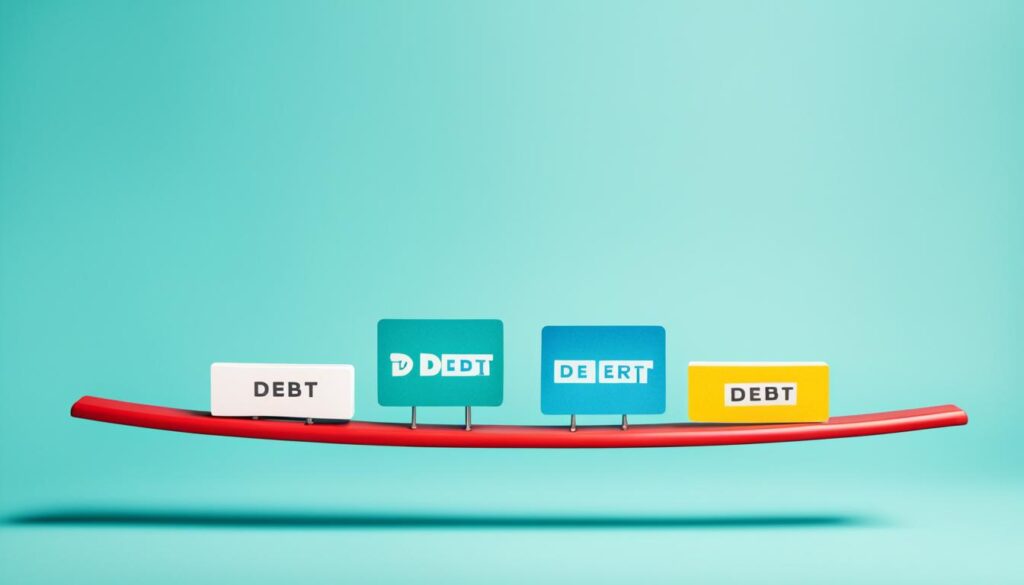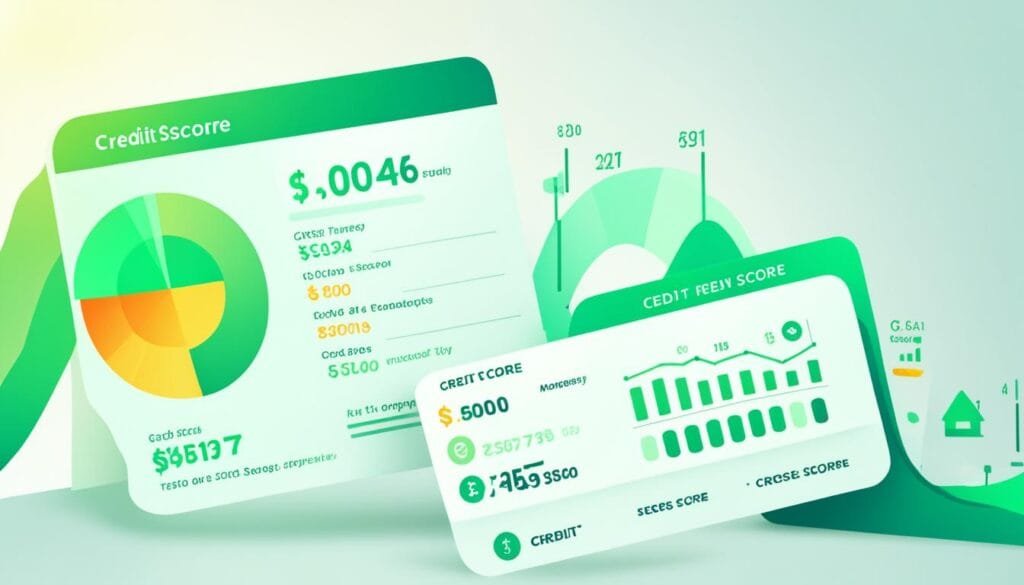Dealing with debt can be overwhelming and stressful, but there are strategies that can help you navigate through it and find financial relief. Imagine you’re sitting at your kitchen table, surrounded by stacks of bills and letters from creditors. The weight of your debt is suffocating, and you’re desperately searching for a way out.
You’ve heard about debt settlement strategies and how they can potentially reduce the amount you owe, providing you with a fresh start. Curiosity piqued, you start researching and exploring your options. You come across stories of people who have successfully negotiated their debts, freeing themselves from the burden that once held them captive.
This image of a person tearing up a pile of documents represents the powerful feeling of liberation that comes with finding a solution to your debt problems. It symbolizes a fresh start and the possibility of rebuilding your financial future.
As you read further, you discover debt negotiation tips and debt reduction techniques that can help you on your journey to financial freedom. You learn about different debt settlement options, the risks and downsides involved, and the steps you need to take to initiate the process.
This article will provide you with a comprehensive guide to smart debt settlement strategies, equipping you with the knowledge and tools you need to navigate this complex terrain. By understanding the intricacies of debt settlement and implementing proven strategies, you can take control of your financial situation and pave the way towards a debt-free future.
Key Takeaways:
- Debt settlement strategies can provide relief from overwhelming debt.
- Negotiating with creditors and seeking professional assistance are key steps in debt settlement.
- Understanding the risks and downsides of debt settlement is crucial.
- Having a written agreement with your lenders and following up on the settlement is important.
- Debt settlement can be a powerful tool for managing debt if approached with caution and diligence.
How Debt Settlement Works
In the debt settlement process, borrowers negotiate with their lenders to reach an agreement on paying a reduced amount of their outstanding debt. Debt settlement can provide a pathway to reduce the burden of debt, but it’s crucial to be knowledgeable about the negotiation process and to be cautious of potential consequences.
Debt settlement can be facilitated through third-party debt relief companies or individuals can negotiate directly with their lenders. At the start of the process, a proposal is made to the lender, offering to pay a percentage of the total balance in exchange for forgiving the remaining debt.
The negotiations aim to find common ground between the borrower and the lender, with both parties seeking a favorable outcome. It is important for borrowers to be aware that debt settlement can have an impact on their credit score. Therefore, before committing to the process, borrowers should evaluate their financial situation and ensure they have the means to proceed.
“Debt settlement can be an effective strategy for individuals facing overwhelming debt. It allows for a restructured payment plan that is more manageable and sustainable in the long run,” says Sarah Johnson, a financial advisor at Wealth Management Co.
Having a written agreement with the lenders is crucial to ensure transparency and avoid discrepancies. This agreement should detail the terms of the settlement, such as the reduced amount to be paid and the timeline for repayment.
Working with a Debt Settlement Company
Many borrowers choose to work with a debt settlement company to navigate the negotiation process. These companies typically have experience dealing with creditors and can provide expert guidance throughout the settlement process.
When selecting a debt settlement company, it’s essential to do thorough research and choose a reputable one. Look for companies that have a proven track record, positive client testimonials, and clear fee structures.
Summary
Debt settlement is a negotiation process where borrowers work with lenders to pay a reduced amount of their outstanding debt. It can provide relief for individuals struggling to manage their financial obligations. Whether negotiating independently or with the help of a debt settlement company, it’s important to understand the potential impact on credit scores and to have a written agreement with lenders. Debt settlement can be an effective strategy for reducing debt, but it requires careful consideration and proactive decision-making.
Risks and Downsides of Debt Settlement
While debt settlement can provide some relief from financial burden, it is important to be aware of the potential risks and downsides associated with this strategy. Make informed decisions by considering the following:
Credit Score Impact
One significant consequence of debt settlement is the potential impact on your credit score. When you settle a debt for a lower amount, it may be reported as a partial payment or charged-off account, which can have a negative effect on your creditworthiness. This can make it more challenging to secure future financing, such as loans or credit cards, and may result in higher interest rates if you are approved.
Tax Consequences of Debt Settlement
Another consideration is the possibility of tax consequences resulting from debt settlement. When a portion of your debt is forgiven by the lender, the forgiven amount may be considered taxable income by the IRS. It is important to consult with a tax professional to understand how debt settlement may impact your tax liability and to ensure compliance with tax laws.
Account Closure After Debt Settlement
Settling a debt with a credit card company can lead to the closure of the associated account. This means that once the debt is settled, you may no longer have access to that credit line. Account closure can limit your ability to use credit cards for future purchases, which may impact your overall financial flexibility. It is essential to consider this potential consequence and plan accordingly to manage your financial needs.
“Debt settlement can provide relief, but it is crucial to understand the potential credit score impact, tax consequences, and account closure that may arise.”
To stay informed and make well-informed decisions about debt settlement, it is recommended to consult with financial advisors, credit counseling agencies, or reputable debt relief companies who can guide you through the process and provide personalized advice.

| Risks and Downsides | Details |
|---|---|
| Credit Score Impact | The debt settlement process can lead to a lower credit score, making it difficult to secure future financing. |
| Tax Consequences | Forgiven debt may be considered taxable income by the IRS, resulting in potential tax liabilities. |
| Account Closure | Settling a debt with a credit card company may result in the closure of the associated account, limiting your access to credit. |
Debt Negotiation Tips
When it comes to debt settlement, effective negotiation skills can make a significant difference. Whether you are negotiating with creditors on your own or seeking professional assistance, there are key tips to keep in mind. By following these strategies, you can increase your chances of reaching a favorable debt settlement agreement.
1. Communicate openly with your creditors
Open and honest communication is crucial when negotiating with creditors. Reach out to your creditors and explain your financial situation. Be prepared to provide details about your income, expenses, and any hardships you are facing that make it difficult for you to meet your debt obligations. Building a relationship based on trust and transparency can work in your favor during the negotiation process.
2. Start with a lower offer
When starting debt settlement negotiations, it’s often wise to offer a lower amount than what you are ultimately willing to pay. Starting with an offer between 25-30% of the outstanding balance can demonstrate that you are serious about resolving the debt and may encourage creditors to negotiate further. Keep in mind that creditors may counter with a higher amount, so be prepared to negotiate until a mutually beneficial agreement is reached.
3. Avoid using credit cards with balances you are trying to settle
Using credit cards with outstanding balances while negotiating debt settlement may make creditors less inclined to negotiate. They may interpret it as a sign that you have the means to pay the full debt and may be less motivated to reach a settlement. To improve your negotiating position, avoid using credit cards associated with the debts you are trying to settle.
4. Seek professional assistance
Debt negotiation can be a complex and challenging process. Seeking professional assistance from reputable debt relief companies or credit counseling agencies can provide valuable expertise and guidance. These professionals can negotiate on your behalf, handle communication with creditors, and help you navigate the negotiation process effectively.
“A skilled negotiator can help you formulate a sound strategy and present compelling arguments during debt settlement negotiations.”
5. Get everything in writing
Once a debt settlement agreement is reached, it is essential to get everything in writing. This includes the agreed-upon settlement amount, any payment terms, and the specific conditions of the agreement. Having a written agreement from your creditors protects both parties and ensures that there are no misunderstandings or disputes in the future.
| Debt Negotiation Tips |
|---|
| Communicate openly with your creditors |
| Start with a lower offer |
| Avoid using credit cards with balances you are trying to settle |
| Seek professional assistance |
| Get everything in writing |
Steps for Debt Settlement
The debt settlement process involves several important steps that can help you effectively manage your debts and work towards a resolution. By following these steps, you can navigate the process with confidence and increase your chances of achieving a successful settlement.
- Review your debt situation: Begin by thoroughly reviewing your debt situation, including outstanding balances and the creditors you owe. This step will help you gain a clear understanding of your financial obligations.
- Evaluate your financial situation: Take a close look at your finances to determine how much you can afford to offer as a settlement. Consider factors such as your income, expenses, and any savings you may have. This evaluation will help you establish a realistic settlement amount.
- Contact your creditors: Reach out to your creditors to propose a settlement. Explain your financial difficulties and the reasons why you are seeking a settlement. It’s essential to maintain open lines of communication throughout the negotiation process.
- Obtain a written settlement agreement: Once you and your creditor have reached a settlement agreement, it’s crucial to obtain a written agreement. Having a written agreement ensures that both parties are clear on the terms and conditions of the settlement and protects your rights.
- Follow up with your creditors: After the settlement is reached, follow up with your creditors to ensure that the settlement is properly reported and that your obligation is met. This step helps you ensure that the settlement is accurately reflected on your credit reports and that you fulfill your end of the agreement.
Benefits of Following these Debt Settlement Steps
By following these debt settlement steps, you can approach the process in a structured and informed manner. This approach increases your chances of successfully reaching a settlement agreement that works for both you and your creditors. It also helps you maintain clear communication with your creditors, protect your rights, and effectively manage your debt situation.

“By following a systematic approach to debt settlement, individuals can take control of their financial situation and work towards a brighter financial future.”
What Percentage Should You Offer to Settle Debt?
When it comes to offering a percentage to settle your debt, it’s important to find the right balance between what you can afford and what will entice creditors to agree to a settlement. While there’s no magic number that applies to every situation, starting with a lower offer can be a good strategy to kick off the negotiation process.
Typically, creditors are more willing to consider a settlement if it’s a substantial percentage of the outstanding balance. A common starting point is offering around 25% or 30% of what you owe. This demonstrates your commitment to resolving the debt and can lead to further negotiation.
However, keep in mind that creditors may counter with a higher amount, as they want to recover as much of the debt as possible. This is where negotiation skills come into play. Be prepared to present a strong case for why your offer is fair and reasonable based on your financial circumstances.
It’s important to note that creditors are not legally obligated to lower your debt or accept your settlement offer. They have the right to refuse and continue pursuing the full amount owed. However, many creditors may still agree to a settlement to avoid the potential loss that comes with legal action or prolonged collection efforts.
In summary, when making a debt settlement offer, starting with a lower percentage, such as 25% or 30% of the outstanding balance, is a common strategy. Be prepared to negotiate and provide a compelling case for your offer. Ultimately, reaching an agreement that both parties can accept is key.
Key Points:
- Starting with a lower offer, around 25% or 30% of the outstanding balance, is a common strategy for debt settlement.
- Be prepared for creditors to counter with a higher amount.
- Effective negotiation skills and a strong case can increase your chances of reaching an agreement.
- Creditors are not legally obligated to accept your offer, but they may agree to a settlement to avoid further losses.
Conclusion
Debt settlement can be a valuable financial strategy for managing debt, but it is crucial to approach the process with caution and careful consideration. While it provides an opportunity to reduce your debt burden, it’s important to understand the potential risks involved. One significant drawback of debt settlement is its impact on your credit score. Settling your debt can result in negative marks on your credit report, which may affect your ability to secure favorable financing in the future.
Additionally, it’s essential to have a clear understanding of the financial requirements of debt settlement. This strategy often necessitates a significant amount of cash to negotiate and settle your debts. It’s crucial to evaluate your financial situation and determine if you have the necessary funds available before pursuing debt settlement.
When engaging in debt settlement negotiations, it’s advisable to negotiate with your creditors directly or seek professional assistance from reputable debt relief companies. This can greatly enhance your chances of reaching successful settlements and establishing manageable repayment plans. Furthermore, having a written agreement with your lenders is essential to ensure all parties are in agreement regarding the settlement terms.
Managing debt settlement requires careful attention to detail, ongoing communication, and follow-up. It’s important to stay in touch with your creditors and ensure that the settlement is properly reported. This will help ensure that your obligations are met, and the settlement is correctly reflected on your credit report.
FAQ
What are some smart debt settlement strategies?
Some smart debt settlement strategies include negotiating with creditors, seeking professional assistance, and starting with a lower settlement offer.
How does debt settlement work?
Debt settlement involves negotiating with lenders to pay a reduced amount of your debt in exchange for forgiving the remaining balance.
What are the risks and downsides of debt settlement?
Debt settlement can negatively impact your credit score, result in tax consequences, and lead to the closure of credit card accounts.
What are some debt negotiation tips?
When negotiating debt settlement, it’s important to communicate with your creditors, start with a lower offer, and avoid using credit cards with balances you are trying to settle.
What are the steps for debt settlement?
The steps for debt settlement include reviewing your complete debt situation, evaluating your financial situation, contacting your creditors, and having a written agreement once a settlement is reached.
What percentage should you offer to settle debt?
It’s common to start with a lower offer, such as 25% or 30% of the outstanding balance, and negotiate with creditors to reach an agreement.
What should I know about debt settlement?
Debt settlement can be a useful strategy for managing debt, but it’s important to understand the risks, approach the process with caution, and have a written agreement with your lenders.

